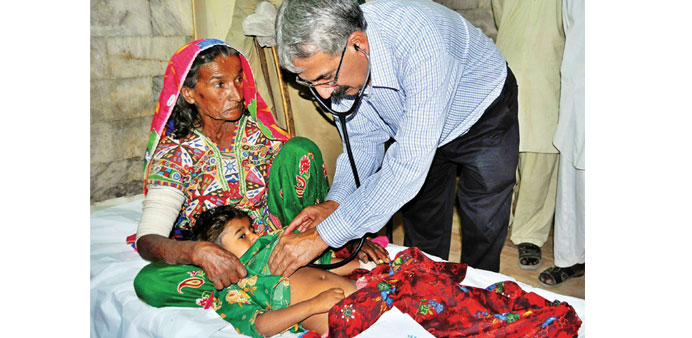Agencies/Islamabad
Dozens of children have died of malnutrition and other causes in Pakistan’s southern region this year, prompting Prime Minister Nawaz Sharif to travel to the drought-stricken area to allocate $10mn in emergency aid.
The UN Office for the Coordination of Humanitarian Affairs (UNOCHA) said 18 children under the age of five had died in January and another 23 in February.
Pakistan’s National Disaster Management Authority (NDMA) confirmed the UN figures, saying 26 under-five children had also died in December when a severe drought hit the Tharparkar area of the southern region of Sindh.
The drought has affected an estimated 900,000 people, according to the Tharparkar deputy commissioner’s office.
Sharif flew to the arid region yesterday to promise $10mn in aid.
“The people will soon be able to return to their homes and prosperity will come to these areas,” Sharif promised in televised comments. “The situation will improve very soon.”
The extreme dry weather is compounding the plight of the impoverished farming region, where health services are poor and unemployment is high.
Hazem el Mahi, a UNOCHA spokesman, said it was too early to say exactly what was causing the spike in child mortality, but that it was a combination of infections and maternal and child malnutrition.
“We are not aware of adult deaths so far,” he said. “We have started a joint assessment with the Pakistan government only today and we can’t know the real situation on the ground until the assessment is complete.”
Pakistani media said the children were dying due to drought-related malnutrition. No figures for deaths in March have been released.
Local media have said relief goods were not reaching the affected area promptly. One report said 60,000 sacks of flour had been dispatched to Sindh but only 900 had been distributed.
“He (Sharif) directed to ensure swift provision of edible commodities, drinking water and medicine to the people,” the prime minister’s office said in a statement. It said Sharif had also ordered strict action against those responsible for “negligence” in distributing wheat in Tharparkar.
NDMA director Raza Iqbal attributed the distribution problems to delays in paying transport companies. “There are administration issues,” he said, but gave no details.
Provincial authorities, relief groups and political parties have sent food, medicine and other items to the drought-hit areas.
In a related development, Chief Justice Tassaduq Hussain Jillani summoned top officials to the Supreme Court in Islamabad and said the country should “should hang down our heads with shame” over the conditions that led up to the deaths and the failure of government to prevent them.
Mumtaz Ali Shah, the home secretary for Sindh province, where the desert lies, earlier told the court: “At least 62 children died, mostly because of unusual cold weather leading to outbreak of pneumonia and poor medical facilities during last three months in Thar.”
But the province’s advocate general Fateh Malik said the situation was not as bad as had been portrayed by the media, claiming disasters were the norm in the impoverished area.
He said 120,000 bags of food have been distributed so far and a compensation of Rs200,000 ($2,000) to the families of the dead.
The court directed the officials to file a detailed statement about the situation with a plan of action by next Monday.
Poor health and communication infrastructure keeps the district disconnected from mainstream population.
In 2000, the desert suffered a famine that killed 90% of the livestock, the economic mainstay of the area.

A woman and her child affected from a famine receive medical treatment at a hospital in Mitthi, Sindh province.
